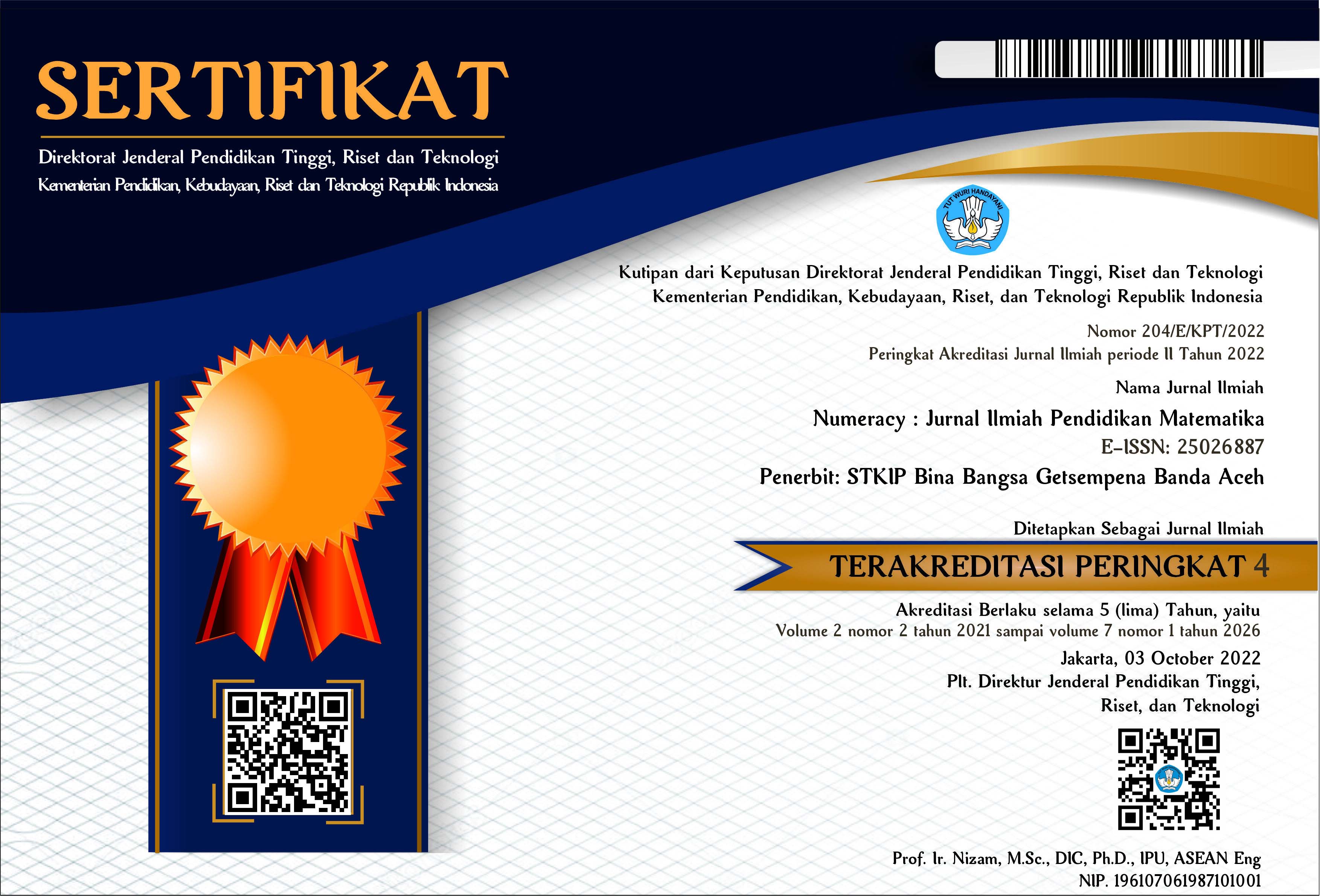PENERAPAN MODEL PEMBELAJARAN PENCAPAIAN KONSEP UNTUK MENINGKATKAN PEMAHAMAN KONSEP
Abstract
The purpose of the research are: (1) Determine the increase in the ability to understand student’s mathematical concepts with the concept of achievement models. (2) Knowing student’s responses to mathematics learning with the concept achievement model. This type of research is Classroom Action Research (CAR). The research subjects were Mathematics Education Students of FKIP UMSU 2018/2019 Academic Year with 34 students with heterogeneous abilities. The object observed in this study was the application of the concept achievement model in an effort to improve student’s understanding of concepts and creativity on the material of flat side spaces. The research data were obtained from the results of the initial and final tests regarding the ability to solve open mathematical problems, observation of lecturers and students. This research consisted of 2 cycles. Each cycle consists of 4 meetings. The results showed that (1) The understanding of the concept of students in the first cycle was 70.58% of 34 students and in the second cycle was 88.23% of 34 students, this meant that there was an increase in cycle I and cycle II so that the application of the concept achievement model could improve understanding of mathematical concepts. (2) Student responses to learning the achievement of concepts are positive. Based on the description analysis of student responses, more than 80% of students gave a positive response to each component of learning the achievement of the concept. From the results of the research analyzed descriptively it can be concluded that the learning of achieving effective concepts in the implementation of learning material builds a flat side space. As a determinant component of effectiveness is an increase in understanding of concepts, increasing student creativity, increasing levels of active student activity and student responses to learning.
Abstrak
Tujuan penelitian adalah: (1) Mengetahui besar peningkatan kemampuan pemahaman konsep matematika mahasiswa dengan model pencapaian konsep. (2) Mengetahui respon siswa terhadap pembelajaran matematika dengan model pencapaian konsep. Jenis penelitian adalah Penelitian Tindakan Kelas (PTK). Subyek penelitian adalah Mahasiswa Pendidikan Matematika FKIP UMSU Tahun Ajaran 2018/2019 dengan jumlah mahasiswa sebanyak 34 orang mahasiswa dengan tingkat kemampuan yang heterogen. Objek yang diamati dalam penelitian ini adalah penerapaan model pencapaian konsep dalam upaya meningkatkan pemahaman konsep dan kreativitas mahasiswa pada materi bangun ruang sisi datar. Data penelitian diperoleh dari hasil tes awal dan akhir mengenai kemampuan pemecahan masalah matematika terbuka, observasi dosen dan mahasiswa. Penelitian ini terdiri dari 2 siklus. Masing-masing siklus terdiri dari 4 kali pertemuan. Hasil penelitian menunjukkan bahwa (1) Pemahaman konsep mahasiswa pada siklus I sebesar 70,58% dari 34 mahasiswa dan pada siklus II sebesar 88,23% dari 34 mahasiswa, ini berarti terdapat peningkatan pada siklus I dan siklus II sehingga penerapan model pencapaian konsep dapat meningkatkan pemahaman konsep matematika. (2) Respon mahasiswa terhadap pembelajaran pencapaian konsep adalah positif. Berdasarkan analisis deskripsi yaitu respon mahasiswa lebih dari 80% mahasiswa memberikan respon positif terhadap setiap komponen pembelajaran pencapaian konsep. Dari hasil penelitian yang dianalisis secara deskriptif dapat disimpulkan bahwa pembelajaran pencapaian konsep efektif dalam pelaksanaan pembelajaran materi bangun ruang sisi datar. Sebagai komponen penentu efektivitas adalah Peningkatan pemahaman konsep, peningkatan kreativitas mahasiswa, peningkatan kadar aktivitas aktif mahasiswa dan respon mahasiswa terhadap pembelajaran.
Kata Kunci: Pencapaian Konsep, dan Pemahaman Konsep
References
Ernest, Paul. (1991). The Phylosophy of Mathematics Education. Rasing Stroke, Hamshire The Falmer Press.
Evans, James.R, (1991), Cretive Thinking, South Western Piblishing C0, Ohio
Munir, (2008). “Kurikulum Berbasis Teknologi Informasi dan Komunikasi.” Bandung: Alfabeta
Romberg, Thomas A. (1986) Curriculum and Evaluation Standards for School Mathematics. Malasyia.
Semiawan, Conny.R, (2009). Kreativitas Keterbakatan. PT Indeks: Jakarta
Suherman, E. (1992). Strategi Belajar Mengajar Matematika. Jakarta : Depdikbud
Sumarno, U. (2003), Daya dan Disposisi Matematik: Apa, Mengapa dan Bagaimana dikembangkan Pada Siswa Sekolah Dasar dan Menengah. Makalah disajikan pada Seminar Sehari di Jurusan Matematika ITB, Oktober 2003.
Sumarno, U. (1987). Kemampuan Pemahaman dan Penalaran Matematika Siswa SMA dikaitkan dengan Kemampuan Penalaran Logik Siswa dan Beberapa Unsur Proses Belajar Mengajar. Disertasi. FPS IKIP. Bandung: tidak dipublikasikan
Suriadi. (2006). Pembelajaran Dengan Pendekatan Discovery Yang Menekankan Aspek Analogi Untuk Meningkatkan Pemahaman Matematik Dan Kemampuan Berpikir Kritis Siswa. Tesis Magister pada PPS UPI Bandung: tidak diterbitkan.



















